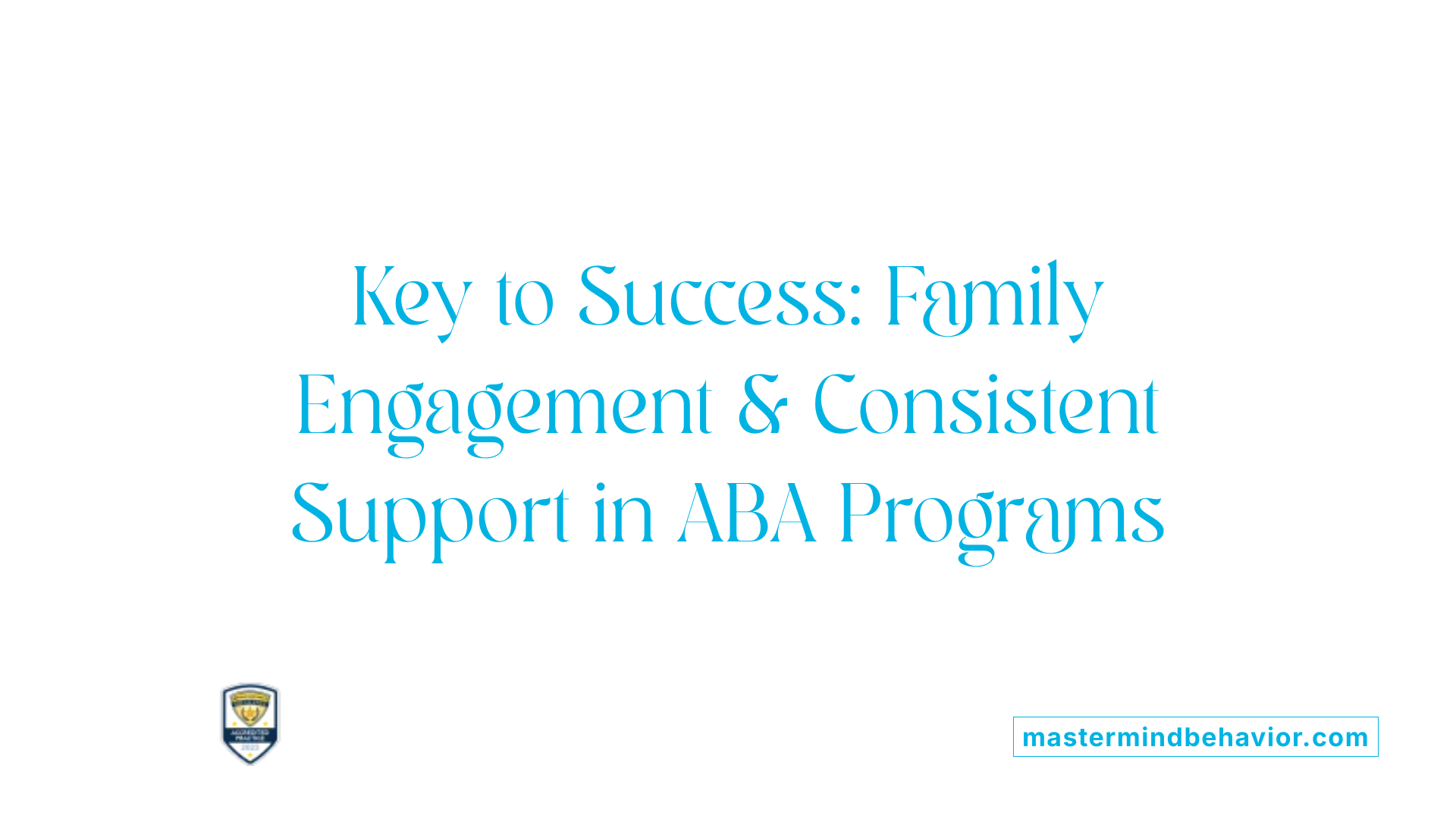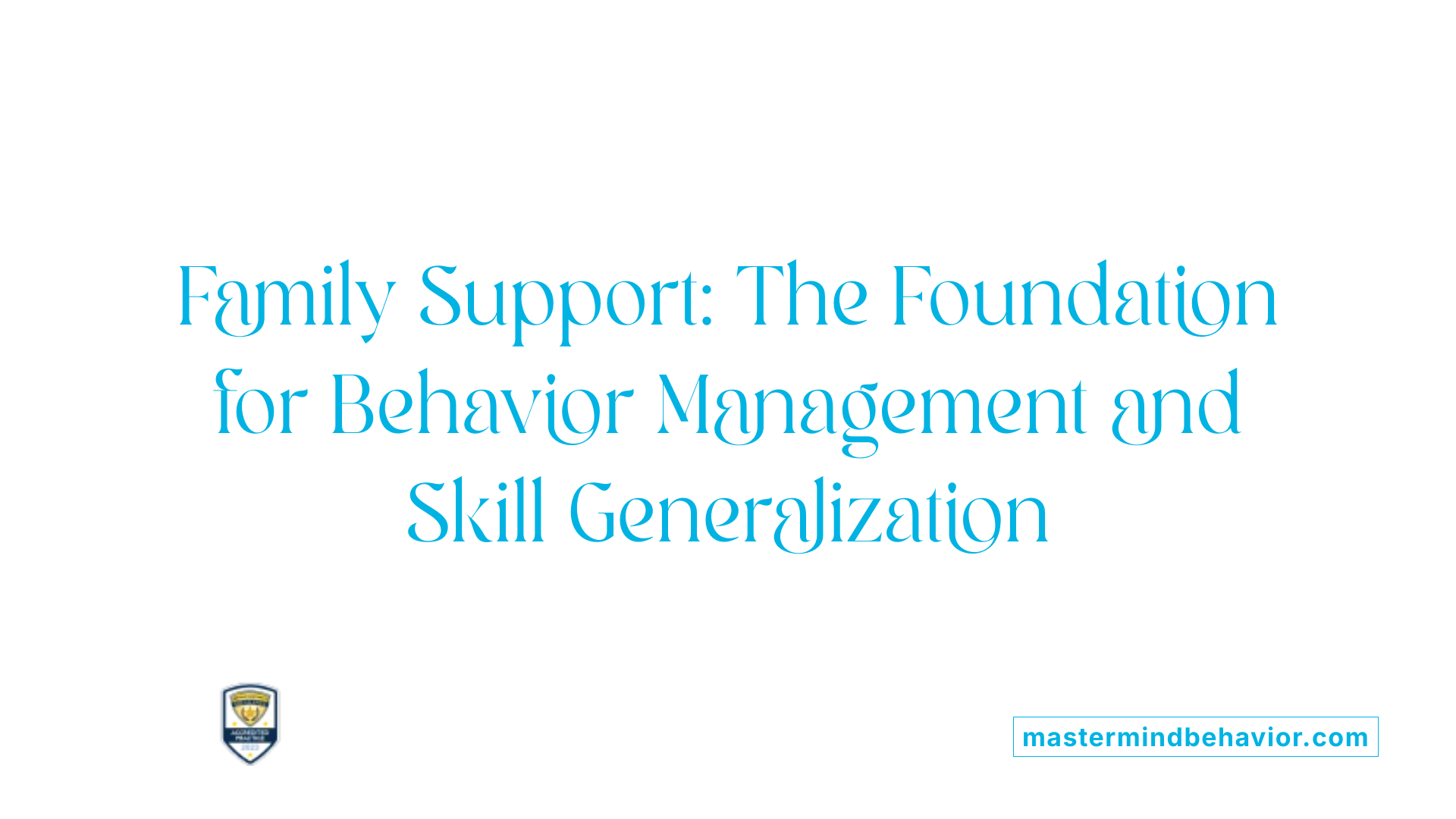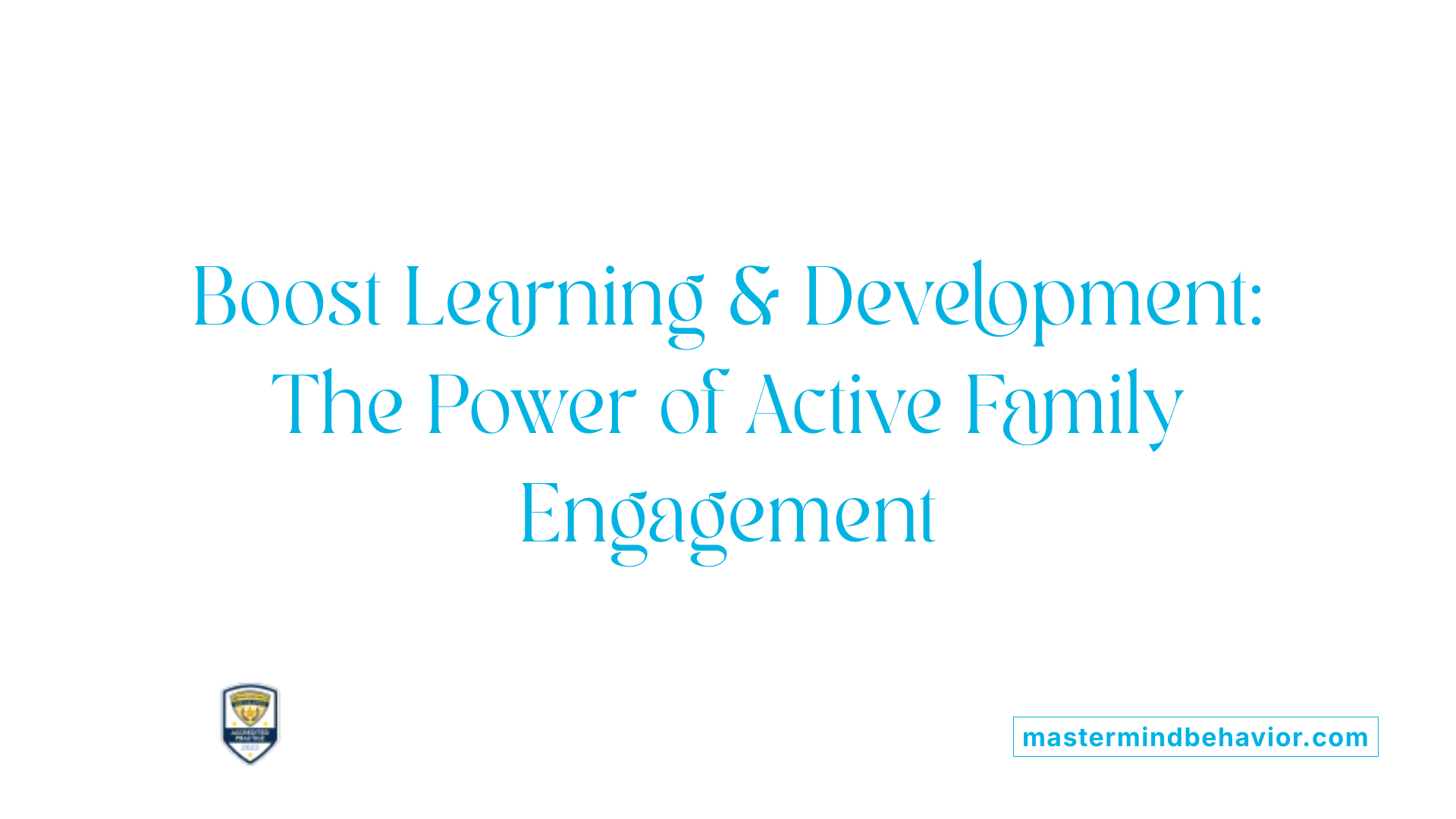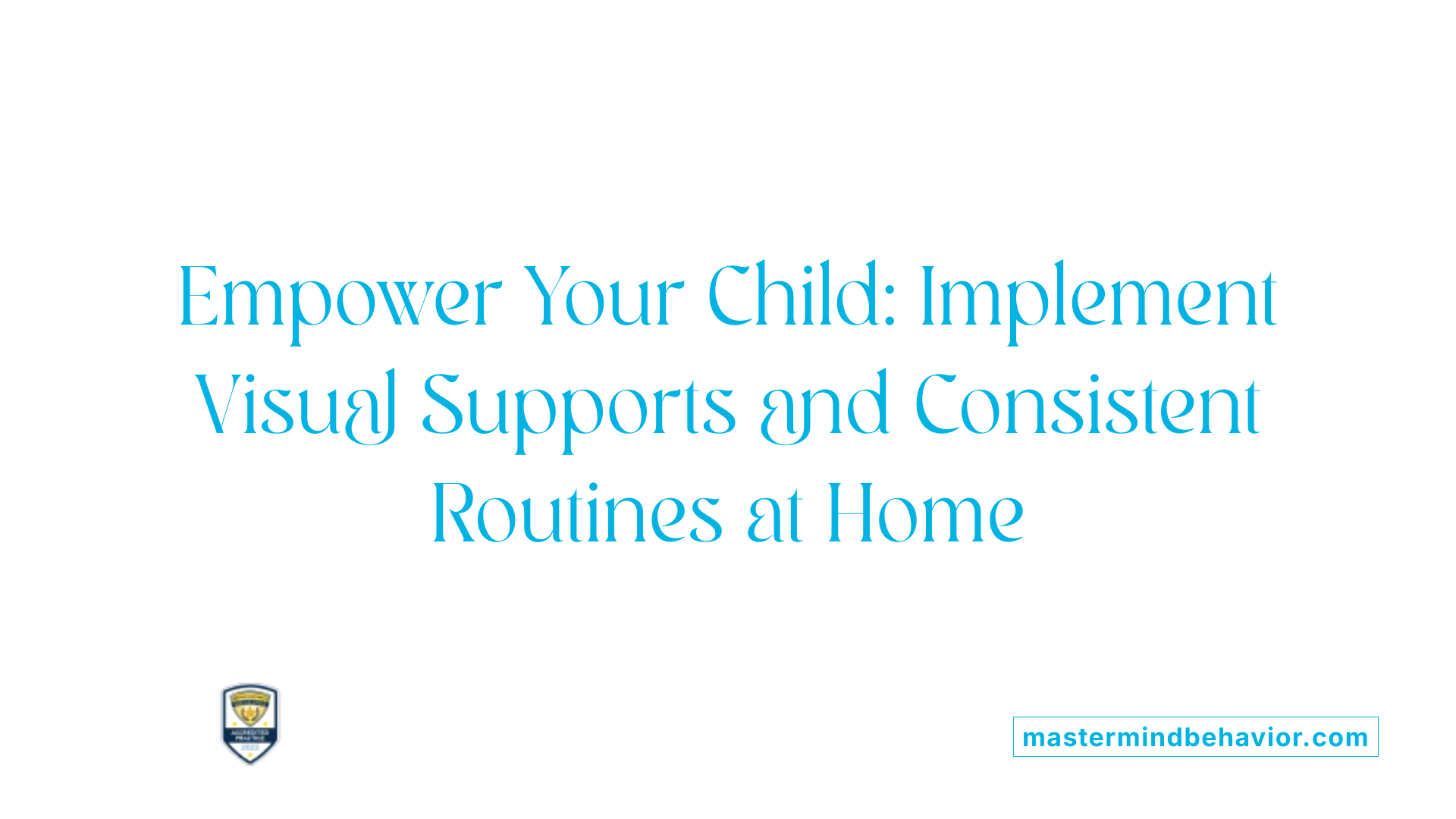Understanding the Crucial Impact of Family Participation in ABA
Applied Behavior Analysis (ABA) has proven to be an effective intervention for children with autism spectrum disorder. However, its success heavily depends on an essential factor: active and consistent family involvement. Families, especially parents, play a pivotal role in reinforcing therapy strategies, generalizing skills learned in sessions to everyday environments, and fostering a supportive atmosphere that empowers the child's development. This article explores the significance of family involvement, practical strategies for parents, and research findings that underscore its crucial role in the effectiveness of ABA therapy.
Key Factors Influencing ABA Program Success

What are the benefits of involving families in ABA therapy?
Family engagement plays a vital role in the effectiveness of ABA programs for children with autism. When parents and siblings participate actively, they help reinforce learned behaviors across different environments, ensuring skills generalize beyond therapy sessions. Such involvement accelerates progress, especially when routines at home are structured and predictable.
Involving families also promotes consistency. Parents trained in ABA techniques can implement strategies during daily routines, which enhances learning and keeps therapy momentum steady. This collaborative approach not only benefits the child's development but also strengthens family bonds and reduces stress.
How can families effectively participate in ABA therapy?
Effective participation involves attending parent training workshops offered by organizations such as the Behavior Exchange, observing therapy sessions, practicing techniques routinely at home, and maintaining open communication with therapists. Families should feel comfortable sharing feedback, asking questions, and actively collaborating on goal setting.
Creating a supportive environment is essential. This includes establishing routines that support therapeutic goals and adapting the home setting to be sensory-friendly and predictable. Incorporating siblings into therapy can also reinforce skills and foster understanding.
What barriers might limit parental involvement?
Various factors can hinder involvement, such as high stress levels, socioeconomic challenges, limited education, and cultural differences. Recognizing these barriers allows therapists and support providers to tailor strategies—like offering virtual training, flexible scheduling, translated materials, and compassionate guidance—to facilitate greater family participation.
Why is family training important?
Family training empowers parents and caregivers with the knowledge and skills needed to support their child's development effectively. It also helps maintain consistency and enables children to practice skills in multiple settings, which is crucial for generalization. When families participate actively and are well-supported, therapy outcomes improve, leading to higher independence, better communication, and overall well-being.
| Involvement Type | Activities | Benefits | Additional Notes |
|---|---|---|---|
| Parent Training | Attending workshops, practicing strategies | Skill reinforcement, better consistency | Available via organizations like the Behavior Exchange |
| Home-based Practice | Applying ABA techniques during routines | Accelerated learning, behavior generalization | Requires support and guidance |
| Collaboration | Sharing feedback, setting goals | Tailored interventions, increased motivation | Builds trust and improves outcomes |
| Siblings' Participation | Including siblings in activities | Reinforces skills and enhances understanding | Promotes family cohesion |
Ultimately, active family involvement is a cornerstone of successful ABA therapy, fostering progress that benefits not only the child but the entire family unit.
Family Support as a Pillar of Behavior Management and Skill Generalization

Why is family support important for the success of behavior management plans?
Family involvement is crucial to the effectiveness of behavior management strategies for children with autism. When families actively participate, they help ensure that learned behaviors and skills are consistent across different environments, especially at home. This consistency reinforces positive habits and minimizes confusion for the child.
Engaging family members in training sessions and daily practice helps create a structured and predictable environment. Routine routines, visual aids, and clear expectations provide children with a sense of stability and help them better understand behavioral expectations.
Moreover, family participation facilitates the generalization of skills from therapy settings to real-world situations. This ongoing reinforcement supports long-term progress and helps prevent regression. Positive reinforcement at home, along with patience and encouragement from family members, fosters a nurturing environment that motivates children, making learning more effective.
In summary, active family support reinforces therapy goals, promotes consistency, and strengthens the child's overall development. It transforms isolated therapy sessions into a cohesive, everyday experience that magnifies progress and sustains improvements over time.
Influence of Family Engagement on Child Learning and Development

How does family engagement influence a child's learning and development during therapy?
Family involvement plays a vital role in a child's progress during ABA therapy. When parents actively participate, they help create a consistent environment that reinforces learned skills across different settings. This ongoing reinforcement ensures that behaviors and skills taught during therapy are practiced at home and in community settings, promoting better generalization.
Shared decision-making and collaboration between families and therapists foster tailored interventions that respect the child's unique needs. Through regular communication and participation in therapy activities, parents can better understand therapeutic goals and techniques, which they can apply during daily routines. This joint effort boosts the child's confidence and motivation, creating a positive atmosphere that nurtures growth.
Furthermore, engaging families allows the therapy to extend beyond clinical sessions, making it more holistic. Families can incorporate strategies such as praise or rewards, helping children feel supported and motivated. This ongoing support builds emotional resilience and encourages independence.
Research confirms that family involvement leads to increased cognitive and developmental gains. When parents are informed, engaged, and supported through training, they can reinforce skills effectively, leading to faster progress and more sustainable outcomes. Ultimately, active family participation enhances the overall effectiveness of the intervention and promotes lasting developmental success.
Creating a Supportive Home Environment to Maximize Therapy Benefits

What is the role of family involvement in ABA therapy success?
Family involvement is central to the effectiveness of ABA therapy for children with autism. When parents and family members actively participate, they help ensure that learned behaviors are reinforced consistently across settings, especially at home. This consistency supports children in generalizing new skills beyond therapy sessions, making interventions more successful.
Involved families create a nurturing environment that incorporates visual supports, structured routines, and positive reinforcement techniques. Such environments help children understand what is expected, reduce anxiety, and promote ongoing development.
Parents and siblings who understand and apply ABA strategies can reinforce positive behaviors, provide emotional support, and maintain motivation. Collaboration with therapists equips families with the necessary tools and knowledge, fostering a unified approach that accelerates skill acquisition and encourages independence.
Support networks and community resources further empower families, helping them remain resilient and engaged. Overall, family participation enhances not only the child's learning outcomes but also strengthens family bonds and optimizes therapy results.
How do structured routines and environmental cues support therapy?
Implementing predictable routines at home provides a stable framework that helps children with autism understand daily expectations. Visual schedules and cues serve as reminders, guiding appropriate behaviors and reducing confusion.
A consistent environment encourages children to practice skills learned in therapy, facilitating mastery and retention. Visual supports like charts or picture schedules enable children to anticipate upcoming activities, which increases feelings of security and promotes participation.
Therapists often recommend creating a sensory-friendly environment, incorporating elements that soothe and stimulate as needed. Such tailored setups support the child's individual needs, allowing them to engage more fully in learning.
How does reinforcement and praise influence learning?
Reinforcement, including praise and rewards, plays a vital role in encouraging positive behaviors. When children are praised for their efforts or accomplishments, they are more likely to repeat those behaviors.
In ABA, reinforcement is strategically used to strengthen desired behaviors and promote skill development. Immediate and specific praise helps children associate their actions with recognition, boosting motivation.
Incorporating reinforcement into daily routines—like rewarding successful transitions or social interactions—supports continual progress and confidence.
How can siblings and extended family be involved?
Including siblings and extended family members in therapy activities enhances skill generalization and fosters understanding.
Siblings can participate in practicing routines or social skills, making learning more natural and meaningful.
Extended family involvement provides additional emotional support and reinforces consistent behavior expectations.
Arranging family training sessions, sharing progress updates, and involving them in therapy can improve communication and relational dynamics, ultimately benefiting the child's development.
| Aspect | Importance | Strategies for Inclusion | Additional Details |
|---|---|---|---|
| Structured routines | Promote predictability and reduce anxiety | Visual schedules, consistent daily activities | Helps children understand and anticipate daily events |
| Reinforcement and praise | Encourage positive behaviors | Immediate praise, token rewards | Strengthens learning and motivation |
| Involving Siblings and Families | Enhance generalization and family bonds | Family training, joint activities | Supports consistent application of strategies |
Family involvement is thus integral, spanning structured routines, reinforcement, and extended participation, forming a comprehensive approach to maximize therapy success.
Barriers to Family Participation and How to Overcome Them
What challenges can limit parental involvement and how can they be addressed?
Family involvement in ABA therapy is essential for optimizing outcomes, but several barriers can hinder parent participation. High stress levels, socioeconomic challenges, cultural differences, and limited education can all impact a parent's ability to engage effectively in their child's intervention.
Understanding these challenges allows providers and therapists to implement strategies that promote sustained involvement. Offering flexible scheduling and virtual training sessions accommodates busy or stressed parents, making it easier for them to participate. Translated educational materials and culturally sensitive guidance help reach families from diverse backgrounds, fostering a welcoming environment.
Additionally, emotional support plays a critical role. Recognizing areas where parents feel overwhelmed and offering resources, such as support groups and community programs, can strengthen resilience. Regular communication and collaboration with therapists build trust and ensure interventions are aligned with family needs and circumstances.
By proactively addressing these barriers, therapy centers can enhance family engagement, ensuring children benefit from consistent, skill-building experiences across all settings. Encouraging families to participate in training, attend sessions, and practice techniques at home helps reinforce progress and promotes long-term success.
Long-term Benefits and Family Empowerment through Engagement
What are the long-term benefits of family involvement in ABA therapy?
Active family participation in ABA therapy offers numerous lasting advantages that extend beyond immediate skill acquisition. Engaged families often experience improved communication and stronger bonds within the household. When parents and siblings understand therapy strategies, they can reinforce learned skills consistently at home and in community settings, which promotes better generalization of behaviors.
This involvement fosters a sense of hope and resilience. Families seeing their child's progress develop are more motivated to sustain therapeutic efforts, even when faced with challenges. As they learn to navigate their child's needs confidently, they become advocates capable of supporting ongoing development.
Moreover, long-term family engagement contributes to sustained developmental progress. It helps ensure therapy gains are maintained and transferred across different environments, such as home, school, and social settings. Families who are involved often develop a comprehensive understanding of their child's unique needs, allowing them to tailor support measures and advocate effectively.
Over time, this continuous support environment promotes greater independence for the child. Families who are actively involved foster an optimistic outlook, fostering shared successes and empowering them to take charge of their child's developmental journey. Ultimately, consistent family participation sustains the positive impacts of ABA therapy, nurturing a foundation for lifelong growth and adaptive functioning.
| Benefits of Family Involvement | Impact | Additional Notes |
|---|---|---|
| Improved family dynamics | Enhances understanding and communication among members | Encourages teamwork in supporting the child's development |
| Fostering hope and resilience | Maintains motivation and optimism | Builds emotional strength within the family |
| Sustained progress | Ensures skills are retained and generalized | Promotes long-term independence |
In sum, family involvement in ABA therapy not only accelerates immediate skill development but also cultivates a nurturing environment that supports the child's ongoing success and well-being.
Harnessing the Power of Family for Better Outcomes
Involving families actively in ABA therapy is not just beneficial but essential for maximizing a child's developmental progress. Through training, collaboration, and creating supportive environments, families can reinforce learning, promote skill generalization, and foster emotional resilience. Overcoming barriers and engaging in open dialogue with professionals ensures sustainable and long-lasting improvements. As research underscores, the partnership between families and therapists can transform therapy into a comprehensive, empowering experience that leads to meaningful and enduring success for children with autism.
References
- The Role of Caregiver Involvement in ABA Therapy
- Part 9: Importance of Family Involvement in ABA Therapy
- The Role of Family in ABA Therapy Success: Engaging Parents and ...
- Impact of ABA Therapy: The Key Role of Parental Involvement
- The Importance of Parent Involvement in ABA Therapy Success
- The Role of Family in ABA Therapy: Tips for Parents
- Incorporating ABA Therapy Activities into Daily Routines at Home
- Explaining Home-Based ABA Therapy's Effectiveness
- Understanding the Role of Consequence Strategies in ABA Therapy ...








